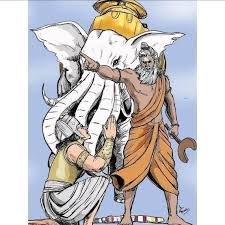ntroduction: The Encounter Between Indra and Maharishi Durvasa
Once, Lord Indra, the king of the Devas, was riding his majestic elephant, Airavata, when he came across the revered sage Maharishi Durvasa. The sage, known for his temper but also his deep spirituality, blessed Indra with a garland, which was the prasadam (grace) of Lord Ishwara. However, Indra, in his pride and arrogance, treated the garland carelessly, placing it on his elephant’s head. The elephant, sensing Indra’s indifference, tossed the garland to the ground, effectively discarding it.
The Consequence of Disrespecting Prasadam
Maharishi Durvasa, understanding the state of Indra’s ego, was displeased by this act of disregard for Ishwara’s grace. The garland was not just a simple decoration; it was the very anugraham (grace) of Ishwara, a divine blessing that had upheld Indra as the king of all the Devas. In response, Durvasa cursed Indra, saying, “Since you have discarded the garland, which was the grace of Ishwara, may that anugraham leave you and make you realize the importance of humility and gratitude towards Ishwara.”
As a result of this curse, Indra lost his prosperity and power, which led to significant turmoil in the heavenly realms. The loss of Ishwara’s grace was a harsh lesson for Indra, teaching him the importance of humility, respect for divine gifts, and the consequences of pride.
The Importance of Prasadam in Sanatana Dharma.
This story illustrates the profound significance of prasadam in Sanatana Dharma. Prasadam is not merely food or flowers; it is a manifestation of Ishwara’s grace. It is said that the divine sight of Ishwara falls upon the offering, sanctifying it, even though Ishwara Himself does not partake in the food. Rejecting prasadam is akin to rejecting Ishwara’s blessings, which can lead to spiritual ignorance and setbacks.
Why Offer to Ishwara When Everything Belongs to Him?
One might wonder why we offer something to Ishwara when everything in creation already belongs to Him. The act of offering is a gesture of love, devotion, and gratitude. Just as a parent expresses love for a child through gifts and actions, devotees express their love for Ishwara by offering Him what they hold dear. This symbolic act allows devotees to engage with Ishwara on a personal level, acknowledging His presence in their lives and expressing their gratitude for His grace.
Lessons from Maharishi Durvasa’s Actions
Maharishi Durvasa’s actions in cursing Indra were not motivated by ego or selfishness. As a sage who had attained Brahma-gyana (knowledge of the absolute), Durvasa’s intention was to guide Indra back to the path of righteousness. By stripping Indra of his glory, wealth, and power, Durvasa provided him with the opportunity to reflect, learn humility, and seek the truth beyond his ego. This story reminds us that the actions of great rishis often serve a higher purpose, helping individuals overcome their shortcomings and grow spiritually.
The Role of Prasadam in Spiritual Growth
According to the Shastras, whatever we consume directly influences our consciousness. It is believed that one-sixth of what we eat contributes to our conscious mind. When we consume Ishwara’s prasadam, it not only nourishes our body but also energizes our consciousness, helping us gain clarity and insight in our lives. In moments of confusion or difficulty, the consumption of prasadam can play a significant role in providing us with the wisdom and understanding needed to overcome challenges.
Conclusion: The Sacredness of Prasadam
This story of Indra and Maharishi Durvasa serves as a powerful reminder of the sacredness of prasadam and the importance of humility, gratitude, and respect for divine gifts. As devotees, we must always receive prasadam with reverence and be mindful of the consciousness with which we approach it. By doing so, we open ourselves to the full extent of Ishwara’s grace, allowing it to guide us on our spiritual journey.
Prayer:
O Lord Ishwara, we humbly bow before You, acknowledging the sanctity of the prasadam You bestow upon us. Please grant us the wisdom to always receive Your grace with humility and gratitude, recognizing the divine blessings in all that we are given. May we never take Your anugraham for granted and always treat it with the utmost respect. Help us to remain free from pride and ego, and guide us to live our lives in devotion and service to You. May the prasadam we receive nourish not only our bodies but also our minds and souls, bringing us closer to You. All glories to Your divine grace. Jai Ishwara!



